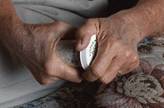- 7 Best Breads for Maintaining Stable Blood Sugar
- Gelatin vs. Collagen: Which is Best for Skin, Nails, and Joints?
- The Long-Term Effects of Daily Turmeric Supplements on Liver Health
- Could Your Grocery Store Meat Be Causing Recurring UTIs?
- Are You Making This Expensive Thermostat Error This Winter?
- Recognizing the Signs of Hypothyroidism
- 10 Strategies to Overcome Insomnia
- Could Artificial Sweeteners Be Aging the Brain Faster?
- Techniques for Soothing Your Nervous System
- Does the Water in Your House Smell Funny? Here’s Why
Steroids No Better for Sciatica Pain Than Placebo, Study Finds


Doctors often prescribe steroid pills to ease the discomfort of sciatica — back and leg pain usually caused by a herniated disk in the lower back.
But a new study finds steroids are no more effective than a placebo pill for the pain and provide only modest improvement in function.
Sciatica affects about one in 10 people in their lifetime, the researchers said. For this study, 269 people with sciatica were randomly assigned to take an oral steroid (prednisone) or a placebo (a dummy medication) for 15 days. The participants were followed for up to a year.
“When we compared the prednisone to placebo, there was a modest improvement in function,” said study researcher Dr. Harley Goldberg, director of spine care services at Kaiser Permanente San Jose Medical Center in California. People reported they could go about their daily activities somewhat better than before.
However, “when we compared the pain [between the two groups], there was actually no difference,” he said.
The finding “doesn’t slam the door” on steroids as a treatment, Goldberg said. Rather, it provides information for patients and their doctors to discuss and decide together the best treatment option.
“Some people could still choose to use it,” he added.
Usual treatments for herniated disk-related sciatica range from self-care, steroid pills and anti-inflammatory medicines, physical therapy, or epidural steroid injections, Goldberg said. When all else fails, surgery is an option, he explained.
This new study found that after a year, the likelihood of spine surgery was no less for those who took prednisone than for those who took a placebo, the researchers reported in the May 19 issue of the Journal of the American Medical Association.
The study results suggest that sometimes the best course is to let the body heal itself, said Dr. Nick Shamie, chief of orthopedic spine surgery at UCLA Medical Center, Santa Monica, who wasn’t involved in the study.
“It is interesting that the pain was not as much improved as the physical function, and yet pain is what the patients come to your office for,” Shamie added.
The study, which ran from 2008 to 2013, included adults who had had the radiating leg and buttock pain for up to three months and said it affected their daily lives. All had a herniated disk, which triggers the pain, confirmed by an MRI.
Half took a short, tapered course of steroids — 20 milligrams three times a day for five days; then twice daily for five days; and once a day for five days — for a total of 600 milligrams. Those on the placebo took identical-looking pills using the same dosing schedule.
Patients reported on functioning ability and pain levels for up to a year. The steroid-treated group was more likely to report a small improvement in functioning, defined as 50 percent, at three weeks and at one year. But pain was similar for both groups at those time points.
Side effects, such as insomnia, increased appetite and nervousness, were twice as common at three weeks in the steroid group. Nearly half reported at least one side effect, compared to about one-quarter of the placebo group. After one year, however, both groups had reported a similar number of side effects, the researchers said.
For anyone suffering from sciatica, Shamie said a specialist’s evaluation and guidance is crucial. “Have them guide you,” he said.
He cautioned against rushing to surgery, pointing to a 2006 study, also published in JAMA, that found sciatica patients were no better two years after surgery in terms of functioning and pain than those who did not have surgery.
If patients are overweight, Goldberg advises losing weight. “There’s no direct evidence that weight loss helps, but we believe it does,” he said. He can’t comment on other options, such as acupuncture, because they were beyond the scope of his study.
More information
To learn more about sciatica, see the American Academy of Orthopaedic Surgeons.
Source: HealthDay
Copyright © 2026 HealthDay. All rights reserved.










